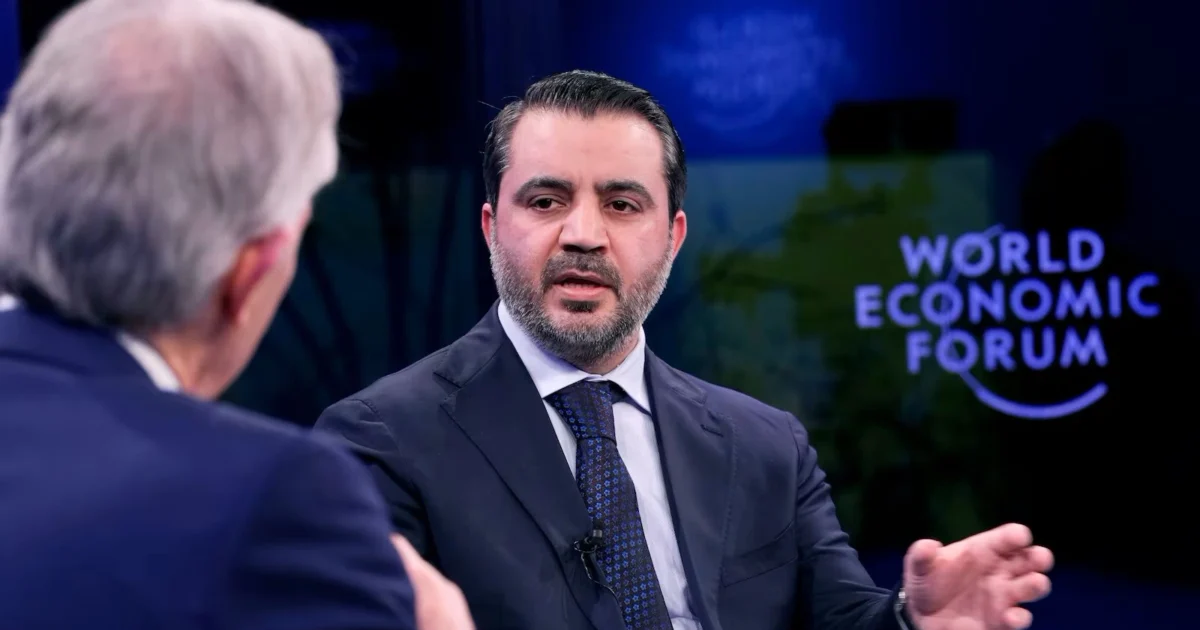In a jaw-dropping display of globalist hypocrisy, the World Economic Forum (WEF) has once again proven that principles and morality are mere props in their endless theater of power. This year’s spectacle in Davos features none other than Asaad Hassan Al-Shaibani, a former face of the terror group Hayat Tahrir al-Sham (HTS), a splinter of Al-Qaeda. Now cloaked in the diplomatic guise of Syria’s new “Foreign Minister,” Al-Shaibani is being paraded as a symbol of progress. At the same time, his government terrorizes minorities and enforces Sharia law back home.
From Black Flags to Champagne Glasses
HTS, born from Al-Qaeda’s Syrian branch, recently seized large swaths of Syrian territory and swiftly began implementing a reign of terror. Under the guise of “liberation,” Al-Shaibani’s government has reportedly targeted Christians, Alawites, and Druze with escalating violence. In these “liberated” zones, alcohol shops are destroyed, women are forced to veil themselves, and public spaces are segregated by gender—the harbingers of full-blown Sharia law.
Yet in Davos, Al-Shaibani was given center stage, moderated by none other than Fabien member Tony Blair, a man whose name is synonymous with the destabilization of the Middle East. Al-Shaibani had the audacity to invoke Saudi Arabia’s Vision 2030 as his blueprint for Syria’s future, conveniently ignoring the systematic persecution his regime unleashes on its citizens. “Saudi Arabia is our role model,” he declared, a chilling statement from an organization once parading under black flags.
Saudi Arabia’s Vision 2030, while marketed as a progressive framework promoting social reforms and modernization, many believe is a facade. The Saudi regime remains a repressive, authoritarian theocracy with a long history of exporting radical ideologies and sponsoring Islamic terror. To hold it up as an inspiration for rebuilding Syria reveals either dangerous naivety or a calculated attempt to mislead the global stage.
The Empty Promise of Vision 2030
Al-Shaibani’s reference to Saudi Arabia’s Vision 2030 as an “inspiration” for rebuilding Syria is yet another layer of deceit in this charade. On paper, Vision 2030 touts noble ideals like social modernization, including enhancing women’s rights, promoting arts and entertainment, and loosening strict social restrictions. But the reality is far from this sanitized image. The Saudi regime remains a repressive, authoritarian theocracy with a long history of exporting terror ideologies and sponsoring Islamic terror. Their carefully marketed reforms are a facade designed to curry favor with the West while maintaining an iron grip on power at home.
For the new Syrian leadership to hold up such a regime as a model reveals either staggering naivety or a calculated effort to mislead the international community. The idea of Saudi-backed “social modernization” is nothing more than a dangerous illusion, one that masks their continued oppression of dissidents, women, and religious minorities. The same can be expected of any regime willing to ally itself with its vision.
Globalists Whitewashing Terror
The WEF’s open arms toward Al-Shaibani exemplify the moral bankruptcy of Western elites. The same Davos attendees who once championed the “war on terror” now applaud a representative of its latest incarnation. This transformation from terrorist to statesman isn’t a redemption story—it’s a charade. For the globalists, HTS’s ascension is palatable only because it ousted Bashar al-Assad, a figure long loathed by the Western establishment. That the Syrian people now face oppression under a different banner seems of little consequence.
The Ugly Reality of HTS Rule
Behind Al-Shaibani’s polished rhetoric lies the grim truth: HTS rule in Syria is defined by fear and repression. Reports from the ground paint a picture of a nation unraveling. Religious minorities live in constant dread of sectarian violence, while extremists freely terrorize communities. Public life is being reshaped under an extremist vision, as personal freedoms are trampled under the pretext of “religious purity.”
The group’s economic policies are equally suspect. Al-Shaibani spoke of “privatizing” key industries such as oil and cotton, as well as opening Syria’s economy to foreign investors. In reality, this is likely to enrich a select few while further impoverishing ordinary Syrians. Meanwhile, his calls for lifting sanctions are couched in concern for the Syrian people but reek of opportunism, aiming to bolster a regime with ties to terror networks.
A Globalist Seal of Approval
The presence of Al-Shaibani at Davos is not an anomaly—it’s a feature of the globalist agenda. The elites who feign concern for human rights and democracy are perfectly willing to embrace anyone who aligns with their geopolitical aims. By rolling out the red carpet for a representative of HTS, the WEF signals that no act of violence or repression is unforgivable if it serves the interests of Western power brokers.
Complicity in Extremism
The spectacle of a former Al-Qaeda affiliate being legitimized on the world stage should send shivers down the spine of anyone who values freedom and justice. Al-Shaibani’s Davos debut is not just a farce; it’s a warning. The globalist elite’s willingness to elevate extremists undercuts any pretense of moral authority. For those suffering under HTS’s brutal regime, the message is clear: Their lives are mere collateral in the great game of global power.
It’s time to call out the World Economic Forum and its ilk for what they are: enablers of oppression dressed in the language of progress. The world deserves better than to see the architects of terror repackaged as harbingers of peace.

